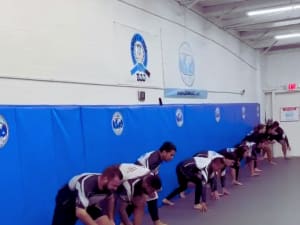
Brazilian Jiu-Jitsu (BJJ) has demonstrated profound benefits for mental and physical health, including veterans and first responders. A comprehensive scoping review published in The Sport Journal explored how BJJ can enhance well-being in these groups. Key findings include improvements in cardiovascular health, strength, and endurance, as well as reductions in symptoms of PTSD, depression, and anxiety. BJJ also fosters social integration by creating a sense of community and reducing isolation.
The Unique Stressors of Veterans and First Responders
Veterans and first responders often face intense stressors, such as exposure to life-threatening situations, high-stakes decision-making, and the aftermath of traumatic events. These experiences can lead to mental health challenges, including post-traumatic stress disorder (PTSD), depression, and anxiety, alongside physical strain from the demanding nature of their roles.
BJJ as a Holistic Remedy
The scoping review highlights several key benefits of Brazilian Jiu-Jitsu for veterans and first responders:
1. Mental Health Benefits
- Stress Relief: The structured and disciplined environment of Jujitsu training helps participants focus on the present moment, reducing stress and fostering mindfulness.
- Camaraderie and Support: BJJ gyms often cultivate a strong sense of community, providing veterans and first responders with a supportive network that understands their experiences.
- Confidence Building: Learning self-defense techniques and mastering new skills can empower individuals, boosting self-esteem and reducing feelings of vulnerability.
- Trauma Coping Mechanisms: BJJ's focus on controlled movements and personal boundaries can help participants regain a sense of control over their bodies, which is crucial for trauma recovery.
2. Physical Health Advantages
- Improved Physical Fitness: The full-body workout provided by jujutsu enhances strength, flexibility, and cardiovascular health.
- Injury Recovery and Prevention: Many veterans and first responders suffer from injuries sustained in the line of duty. Brazilian Jiu-jitsu training can aid in rehabilitation by improving mobility and strength under the guidance of trained instructors.
- Weight Management: The intense, consistent exercise offered by Jiujitsu can help combat weight gain, a common issue for individuals transitioning out of active-duty roles.
3. Enhancing Resilience
BJJ mirrors real-life challenges, requiring participants to think critically, adapt, and persevere under pressure. These skills are directly transferable to the high-stress environments faced by veterans and first responders.
The scoping review underscores the potential of Brazilian Jiu-Jitsu to enhance the lives of veterans and first responders. As more studies validate these findings, it becomes imperative for communities and policymakers to support initiatives that make Jiu-jitsu accessible to these groups.
BJJ isn’t just about physical combat; it’s about fighting for a better quality of life. For veterans and first responders, stepping onto the mat might be the first step toward healing, resilience, and connection.
Ready to start your BJJ journey? Explore the life-changing potential of BJJ—join a class today! If you're in the Naples area, check out Global Jiu-Jitsu Naples to get started and register for a free week trial!
